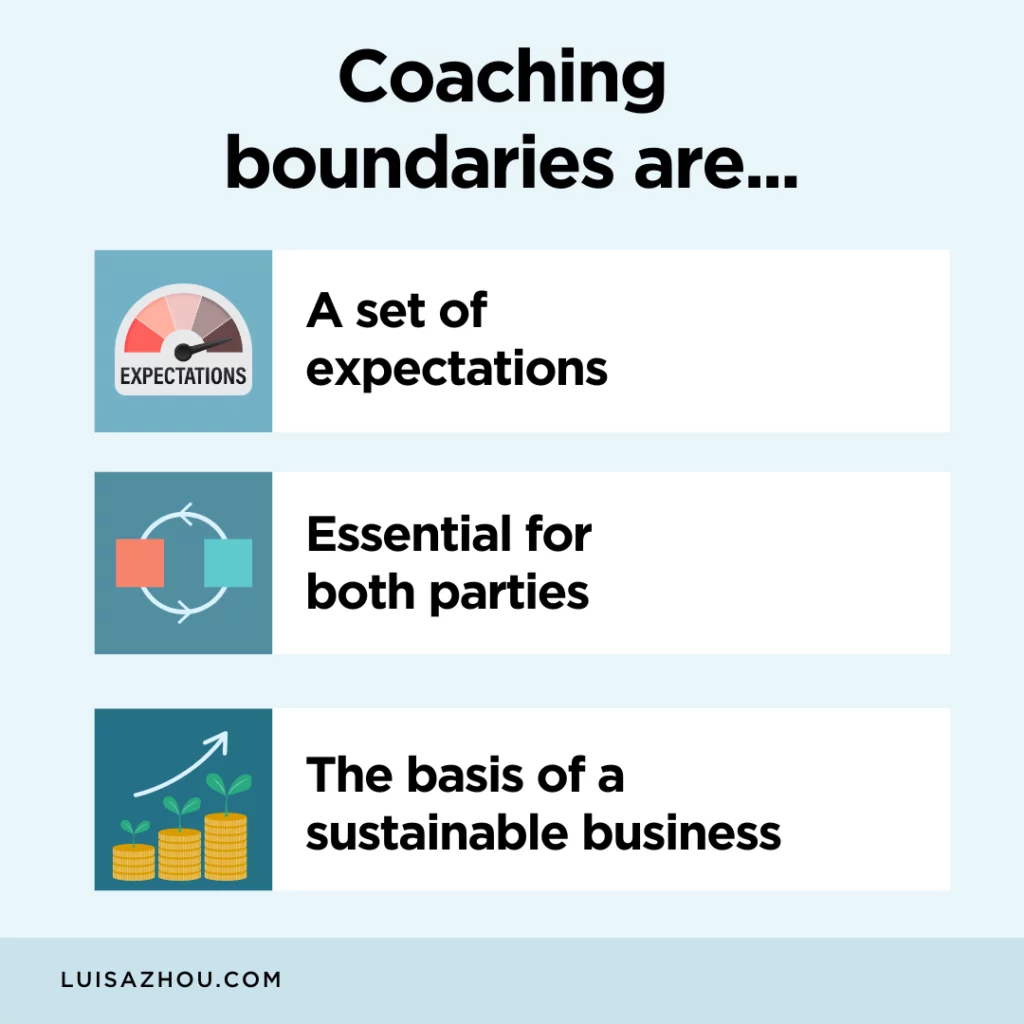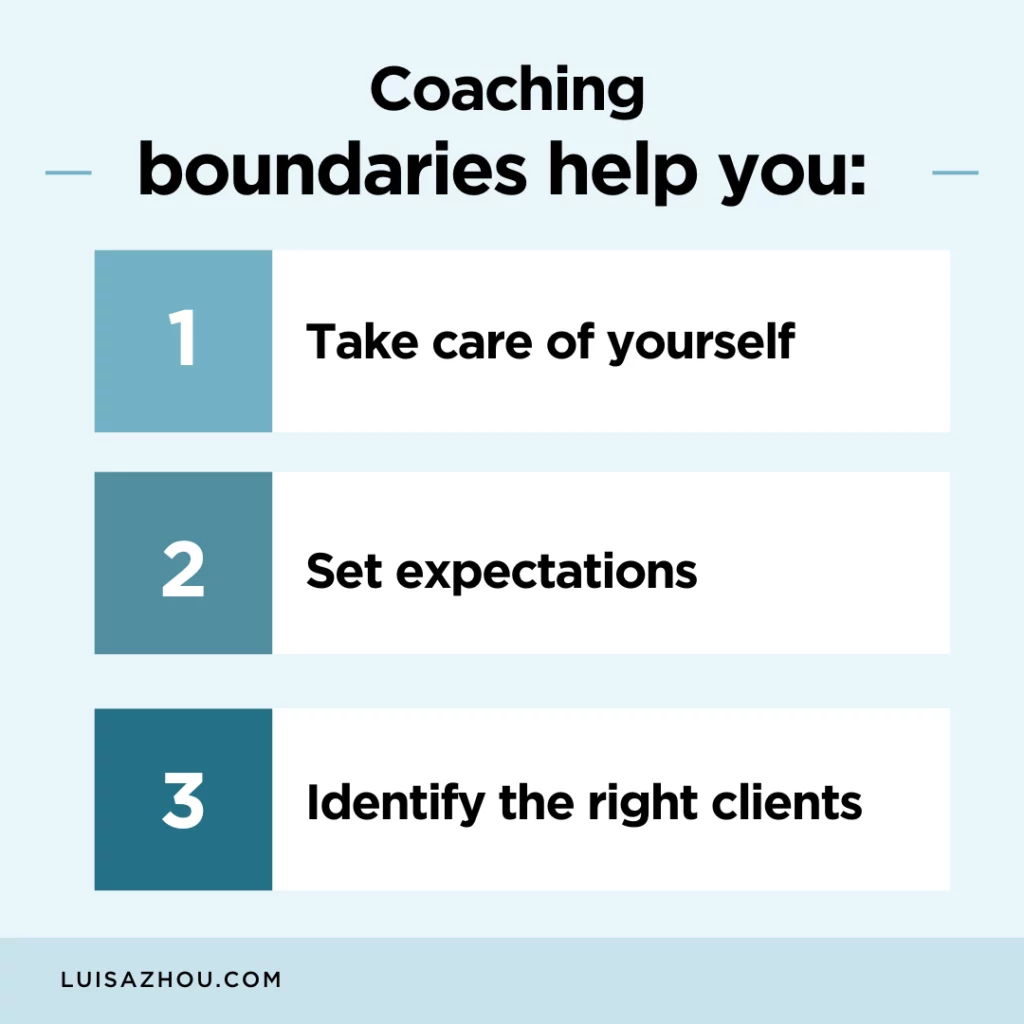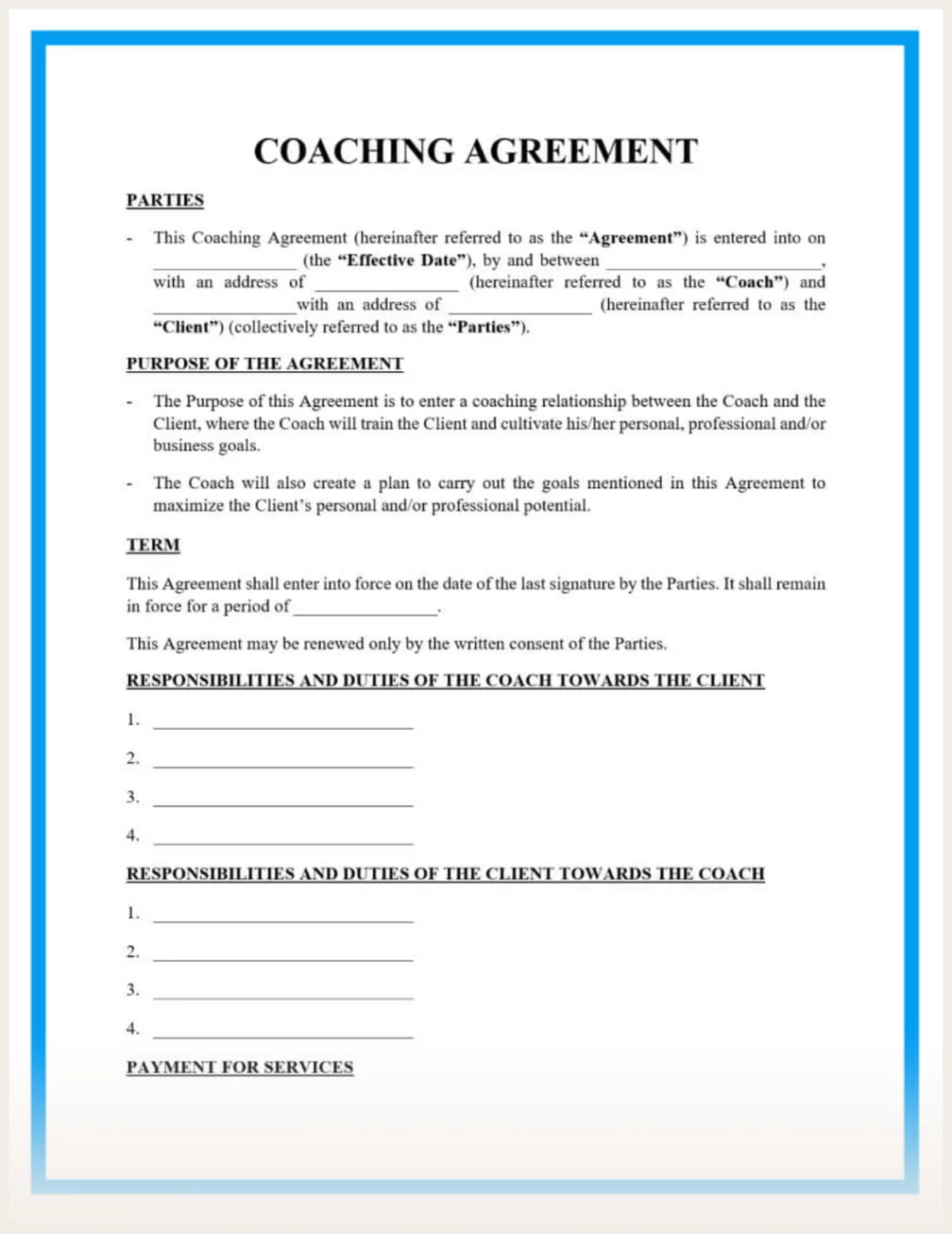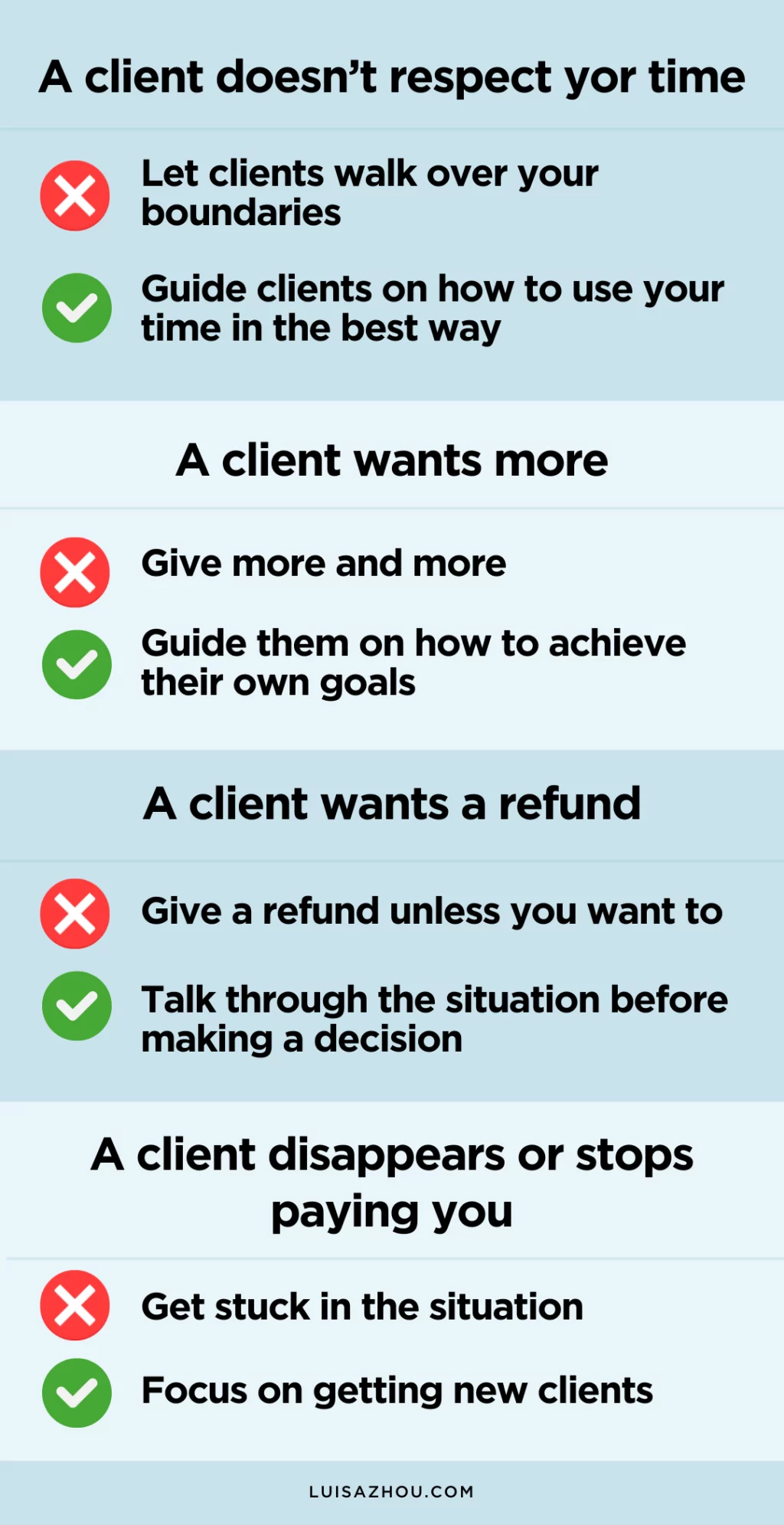Healthy relationships rely on boundaries, right?
That’s true for friends and partners — as well as for your coaching clients.
But what do coaching boundaries actually look like?
How do you set them, and how do you maintain them?
Let’s discuss everything you need to know.
What are coaching boundaries?
First, we need to define “coaching boundaries,” since they’re a bit different from other types of boundaries.
Coaching boundaries are basically a set of expectations that every coach should outline with their clients.
These expectations address everything from communication guidelines to privacy.
Boundaries are essential for both parties. They ensure that everyone involved feels safe, respected, and comfortable. And they’re the basis of a sustainable, successful coaching relationship.

But why are coaching boundaries so important?
Here are a few of the top reasons:
- Coaches can get overwhelmed, just like anyone else. Take care of yourself by setting clear boundaries and having a plan for what to do if they’re not respected.
- Clients can feel resentful if they expect more than you’re able or willing to offer. By defining expectations from the start, you prevent disappointment later on.
- Not every client is going to be a perfect match, and that’s okay. Having boundaries helps you identify the clients you want to work with.

Are you ready to implement some boundaries?
In the next section, we’ll take a look at what boundaries look like in practice.
Get the Ultimate Guide
for building a
6-Figure Coaching Business so you can achieve more freedom!
How to set coaching boundaries before you start coaching
Now you’ve seen why boundaries are so important for any coaching business. But how and when do you actually set them?
In general, it’s best to discuss and confirm boundaries – in writing – on your sales call and in your contract.
That said, it’s also ok to rethink your boundaries later on.
Let’s jump into the details.
Know your value
Part of setting boundaries is knowing your own value as a coach and feeling confident about the product you’re offering.
But it’s still a good idea to overdeliver as you get started with your coaching business.
That’s because you’re building your reputation, and putting in some extra time and effort is a great way to do that.
After all, getting testimonials from your first few clients will help you build your business faster.
For example, when I started coaching, I would prepare for hours for my coaching calls. I’m not saying you need to do that – but do what needs to be done to help your clients achieve their goal.
However:
As you grow and perfect your approach, you’ll see that your value as a coach isn’t in the time you spend on the job.
It’s all about your experience and the results you help your clients get.
Of course, you don’t want clients to feel neglected or unsatisfied.
But you’re not going to be the best coach you can be if you’re overworked and overstressed.
So, as you develop your coaching program and the boundaries that you’re comfortable with, there’s one powerful question that should guide you:
Am I doing this for me or for the good of the client?
For more on how to answer that question, check out this video I made:
Now let’s take a closer look at expectations.
Set the right expectations
As we’ve already seen, boundaries and expectations go hand in hand.
That’s because your clients might come to the table with unrealistic or exaggerated ideas about the service you’re offering.
For example:
They might think you’re going to do a lot of the work for them — or that you’ll be on call to answer questions 24/7.
And some clients might not realize that the results they seek take time.
So, you need to be clear in your messaging BEFORE you accept a client.
You can say, “Getting results that fast isn’t sustainable. I want to help you achieve results that hold in the long-term.” And explain how your coaching does that. Also, make sure that you’re transparent about when you’ll be available for in-between support.
Ultimately, you’ve got to set limits. Let’s take a closer look at how to do that.
Create communication guidelines
You can communicate with your clients in multiple ways, including text, email, phone, video calls, and various coaching platforms.
Trying to use them all, or even just a few, can quickly become overwhelming.
So think about which options you prefer and which platforms your clients are most likely to use.
As you consider what’s best for you, think through some of these questions:
- Do you want to work on weekends?
- Which platform(s) are you most comfortable using?
- What sort of response time can you guarantee?
- Are you the primary point of contact, or will it be a colleague of yours?
- How often can your clients expect to hear from you?
Then, when you begin a new client relationship, outline your availability as well as how and when you’ll be in touch.
For example, I prefer communicating through email and WhatsApp. And I tell my clients that they can expect a reply within 48 hours on business days.
Don’t overthink it. You can always reassess your preferences as your business grows.
If you feel something isn’t working out as you hoped, take a moment to discuss and confirm changes with the client.
In this video, I discuss how I adjusted my boundaries over time:
Set up a contract
Now that you’ve thought through expectations and communication guidelines, how do you ensure that they’re respected?
That’s where a coaching contract comes in.
A coaching contract is a legal document that outlines your responsibilities — as well as your client’s.
It’s an essential way to protect your income and your business as a whole.
Get the Ultimate Guide
for building a
6-Figure Coaching Business so you can achieve more freedom!
Typically, the contract defines:
- Your role
- The scope of activities
- Fees & payment methods
- Your cancellation policy
- Confidentiality
Now, we all know legal advice is EXPENSIVE. And if you’re just starting out, the last thing you want is to spend thousands on a lawyer.
I made that mistake early on. I spent a ton on a lawyer — and they produced a contract I couldn’t even use!
I don’t want you to face a similar situation. So I consulted Lisa Fraley, an excellent attorney and legal coach.
Together, we produced a guide on how to create a solid contract for your coaching business.
Lisa also offers ready-made agreements and templates, which I highly recommend.

Choose the right clients
You need to agree on clear boundaries with your client.
But it’s also on you to consider whether a certain client is a good match before you sign any deals.
As you encounter more and more potential clients, you’ll start to get a feel for which ones aren’t worth your time.
In the meantime, a couple of red flags to watch out for include:
- Clients who are more focused on your refund policy than on your service
- Clients who don’t know what they want from coaching
For more on that — and how to deal with the difficult clients who slip through the cracks — check out this article.
Maintain confidentiality
We’ve talked a lot about establishing your boundaries as the coach, but don’t forget that this is a two-way street.
And one thing that’s especially important for many clients is confidentiality.
Your clients should be comfortable sharing their vulnerabilities and concerns with you.
After all, working through obstacles is part of the growth process — and it’s part of your job as a coach.
So, to foster a space where your clients feel safe, you need to keep their information confidential.
It’s not only good practice; it’s also your ethical responsibility.
For example, the International Coaching Federation’s Code of Ethics provides a complete breakdown of these standards.
How to handle clients who overstep your boundaries during your coaching relationship
Even when boundaries are discussed and agreed upon, the reality is that some clients simply don’t respect them.
Let’s go through a few challenging scenarios that you might encounter.

A client doesn’t respect your time
This client is someone who emails you repeatedly, at all hours of the day.
Or they show up late to every appointment, want you to reply immediately, and expect you to be flexible.
In such cases, it’s important that you stick to the timeframes you agreed upon.
Remember:
Boundaries exist to strengthen your coaching relationship — and to ensure that YOU have the time you need to be the best coach possible.
So you might tell your client something like:
“Let’s condense the way you’re asking these questions…”
“Let’s hold off on this until the next coaching call…”
“I want to take a bit of time to give you the best response…”
“I’m here to support you but as we talked about on our sales call…”
Keep in mind that your clients are adults who are responsible for their actions.
For most, a respectful conversation about boundaries will do the trick.
But it won’t always fix the problem.
A client wants more
At the end of the day, coaching isn’t a “done-for-you” service. Your role is to support, mentor, and advise.
If a client is seeking more than that, you need to know where to draw the line.
And that often means having a tough conversation about — you guessed it — boundaries.
That said, confronting a client who’s overstepped can be tough, and it’s totally natural to feel anxious about it.
You might be concerned about losing them as a client or upsetting them.
But confrontation doesn’t need to cause a rift.
So, think through your approach ahead of time, and always take a firm but professional tone.
Don’t forget: You’re also modeling how to be a good coach in the process.
Get the Ultimate Guide
for building a
6-Figure Coaching Business so you can achieve more freedom!
A client wants a refund
Even if your expectations are clear from day one, refunds still happen every now and then.
When someone comes to you looking for a refund, keep in mind it’s not about you or your value as a coach.
Instead, your client’s request is probably coming from a place of fear.
Usually, clients will say things like, “I’m not sure I can make this happen” or “I’m not sure this is working.”
As their coach, it’s your job to reassure them that they’re on the right track. And if you have delivered what you promised, you absolutely should get paid.
And a call is a great way to talk it through.
That’s why I recommend replying to refund requests by saying, “Let’s hop on a quick call to talk about this.”
For example, I once had a client who had it tight financially — something that makes me usually reject people who want to sign up for my coaching.
But as she really wanted to work with me, I accepted her as a client. A few months later, she emailed me and asked for a refund.
When we hopped on a call, she said that she didn’t really think it could happen and that her finances were running out.
We talked it through and I pointed out why I DID believe she could make it happen, based on what I had already seen. (If I wouldn’t have seen that potential, I would have released her on that call.)
She got renewed motivation and ended up being one of my top students. Soon enough, she was making $5,000/month and only grew from there.
Nonetheless, not all clients will respond positively.
Some might continue to demand a refund, and there’s not too much you can do at that point.
For this reason, I recommend a no-refund policy. After all, you can’t get the time back that you’ve already spent working with a client.
In this video, I discuss how to decide which refund policy is right for you:
So that’s the deal with refunds.
But what about clients who simply disappear?
A client disappears or stops paying you
At some point in your career, you’ll probably have a client who will ghost you.
It’s not fun, but it’s the reality — and you’ve got to be prepared for it.
That’s where the contract we discussed earlier comes in.
As long as you have a written agreement, there are various legal steps you can take, including:
- Chargebacks
- Sending someone to collections
- Contacting a credit agency
However, you might decide that pursuing the case further just isn’t worth it.
Instead, it’s often wise to focus on finding new clients who will respect you and your time.
At the end of the day, it’s your call. But at least you know your options.
For some additional tips on how to handle tricky situations like these, check out this video:
What’s next?
Now you know all of the essentials regarding coaching boundaries.
With this knowledge, you can confidently define expectations with your clients — and then reinforce them.
But there’s much more to a business than boundaries.
And that’s what I share in my FREE blueprint that shows you the things you MUST have in place to build a successful coaching business:

Want to Build a 6-Figure Coaching Business So You Can Achieve More Freedom?
When you sign up, you’ll also receive regular updates on building a successful online business.
Read More:
What is a Coaching Philosophy?
Legal Requirements for Coaches
How to Pick the Right Coaching Insurance
The Best Coaching Questions to Ask Your Clients
The Best Coaching Intake Form Questions








